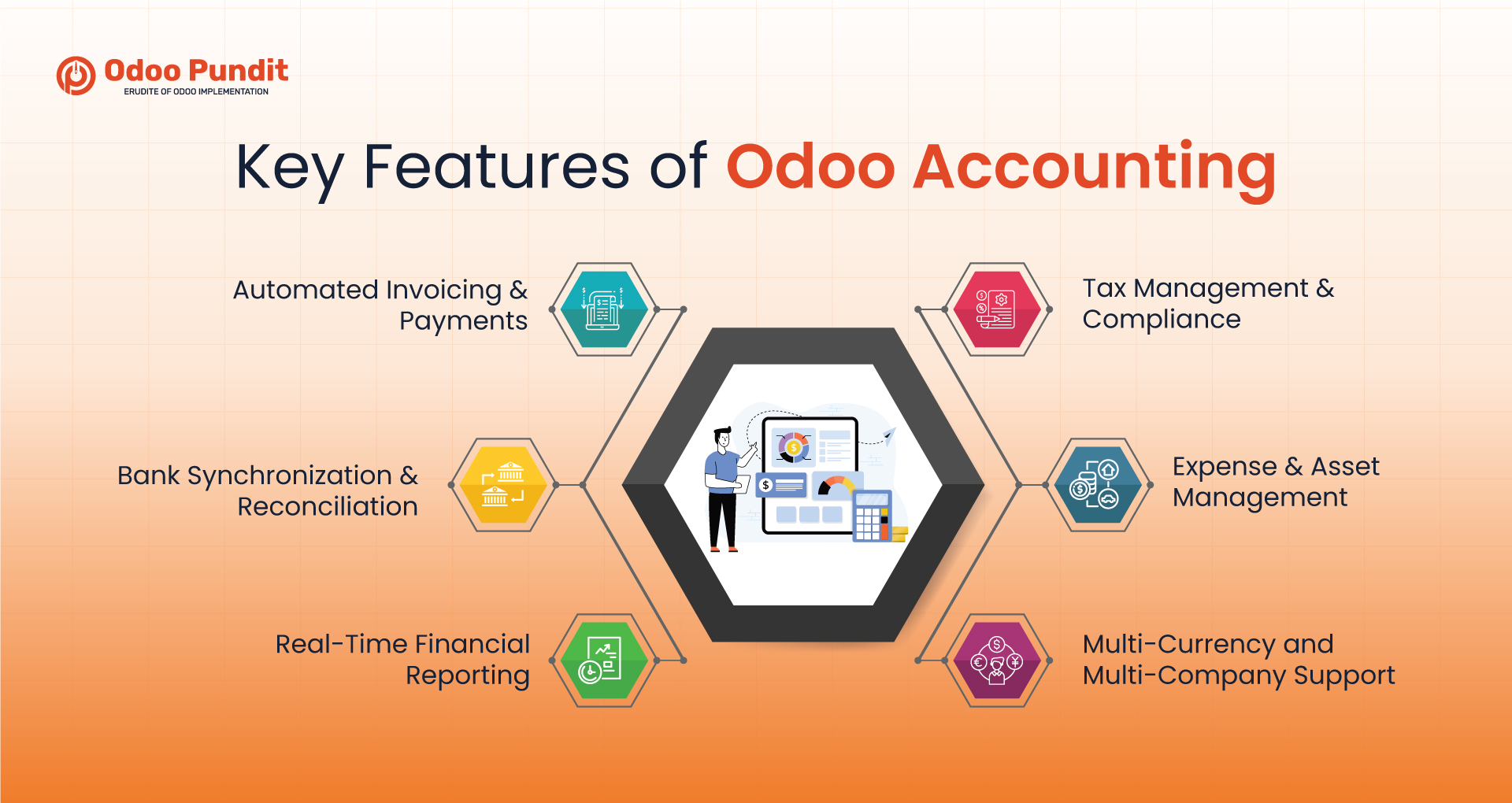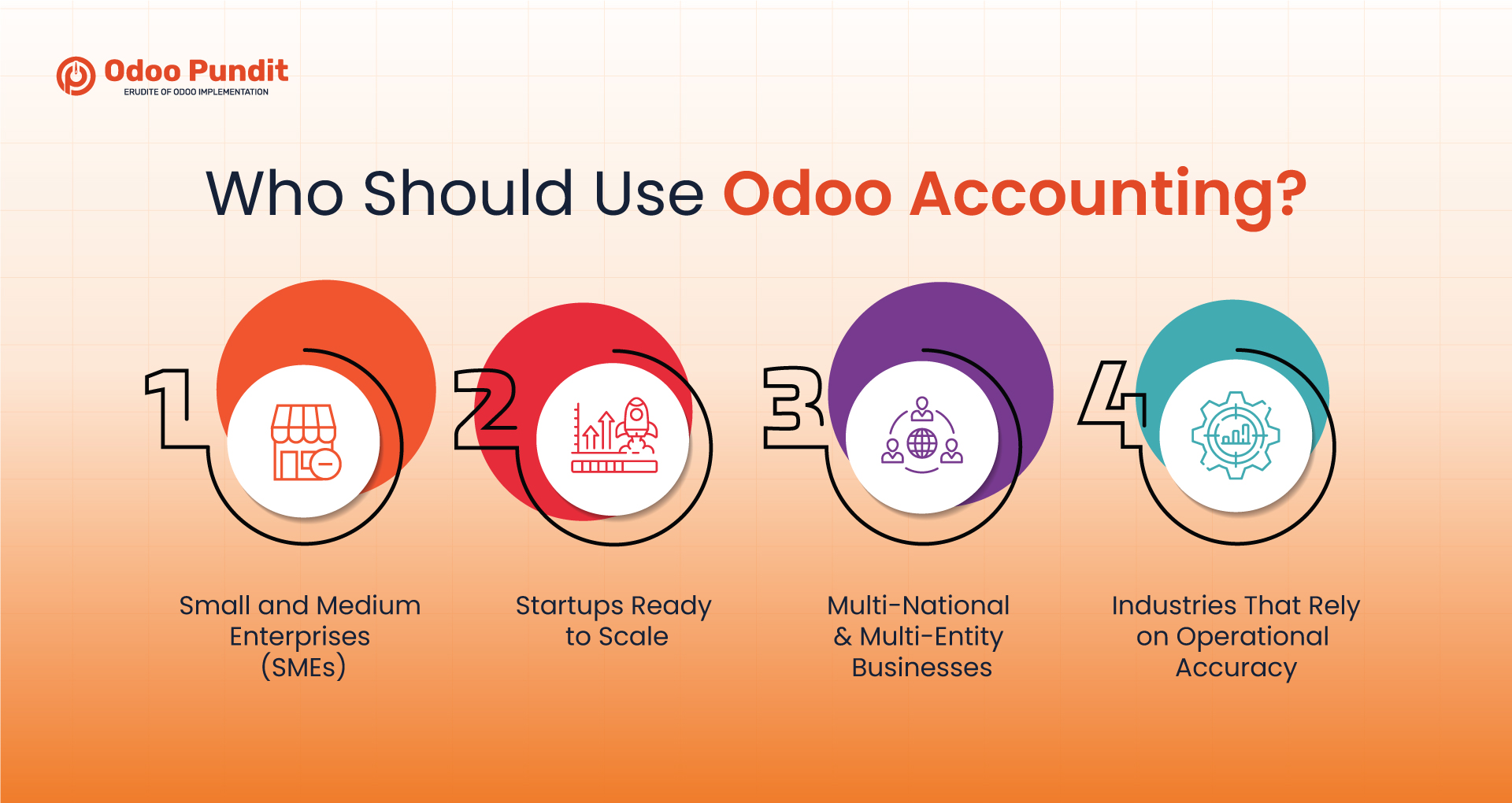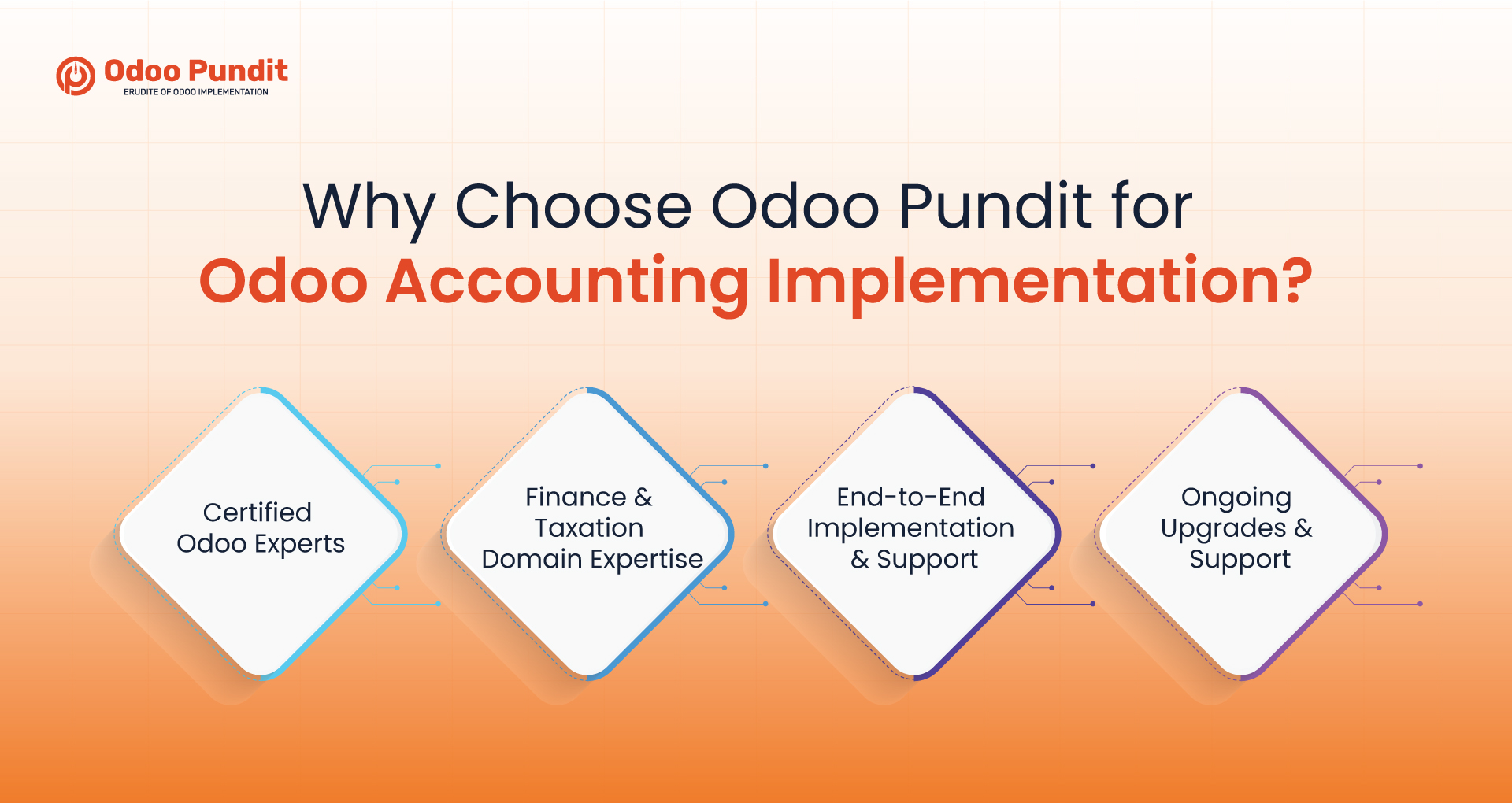Introduction:
In today’s fast-moving business world, accounting is not just about keeping records. It plays a big role in making decisions, staying compliant with laws, and helping your business grow. Whether you run a small startup or a growing company, it’s important to clearly understand your financial situation.
If you are a startup company or a growing company, you need
But many businesses still face problems with old or disconnected accounting systems. Issues like manual data entry, delayed account matching, tax compliance worries, and scattered financial data can slow things down and lead to expensive mistakes.
That’s where Odoo Accounting can help.
As part of the complete Odoo ERP system, Odoo Accounting is a modern and easy-to-use tool that helps businesses of all sizes manage their finances better. It handles tasks like automated invoicing, live financial reports, tax management, and bank syncing—all in one place.
In this blog, we’ll explain the main features of Odoo Accounting, how it fixes common accounting problems, and why it’s a smart and flexible ERP accounting tool. If you're looking for better business accounting software or planning to upgrade, this guide will show you how Odoo can improve the way you manage your finances.
What Is Odoo Accounting?
Odoo Accounting is a smart and easy-to-use financial management tool that’s part of the larger Odoo ERP system. It helps businesses handle everything related to money, like sending invoices, tracking expenses, managing taxes, and keeping your bank accounts in sync.
What makes it powerful is how well it connects with other Odoo apps such as Sales, Purchase, Inventory, and HR. This means all your financial data stays up to date across your business without switching between different software.
Odoo Accounting is available in two versions:
- Community Edition (Free): Good for basic accounting needs like invoicing and simple reports.
- Enterprise Edition (Paid): Comes with advanced features like automation, multi-company setup, and real-time dashboards.
If you want to learn more about the differences between these two versions, check out our detailed blog: Odoo Community vs Odoo Enterprise.
It also supports multiple currencies, multiple companies, and different languages, which makes it great for businesses that operate globally or plan to grow.
In short, Odoo ERP Accounting is more than just bookkeeping; it’s a cloud-based accounting ERP that helps you stay organized, save time, and make better financial decisions.
Key Features of Odoo Accounting

Odoo Accounting is more than just a tool for tracking numbers—it's designed to make managing your business finances easier, faster, and smarter. Whether you're a startup or an established enterprise, these features help reduce manual work, stay compliant, and gain better financial control.
1. Automated Invoicing & Payments
Creating and sending invoices manually takes time and effort. With Odoo’s automated invoicing, you can generate professional invoices right from your sales orders, timesheets, or subscription plans.
You can also set up automatic reminders for overdue payments and allow customers to pay through an online portal, making the payment process smooth and customer-friendly.
2. Bank Synchronization & Reconciliation
No more downloading statements and uploading them manually. Odoo connects to over 26,000 banks worldwide to sync your transactions in real time.
Its smart reconciliation tool uses machine learning to suggest matches between your bank entries and accounting records—saving hours of manual effort every month.
3. Real-Time Financial Reporting
Want to check your business’s financial health? Odoo gives you access to important reports like Profit & Loss, Balance Sheet, Aged Receivables, and Cash Flow—all just a few clicks away.
You can also build custom dashboards and KPIs, helping you make smarter decisions based on real-time data from across your business.
4. Tax Management & Compliance
Staying tax-compliant can be a headache, especially if you sell in multiple regions. Odoo makes this easier by automatically applying the right tax rules, calculating tax amounts, and generating detailed reports.
It also supports e-invoicing and return filing (region-dependent), so your business stays compliant without needing third-party tools.
5. Expense & Asset Management
With Odoo, employees can submit expense claims by simply snapping a receipt on their mobile phones. Approvals and reimbursements happen faster, and everything is logged automatically.
You can also track your company’s fixed assets, apply depreciation rules, and manage asset values directly inside the platform.
It integrates with Odoo’s HR and payroll modules for smoother back-end operations.
6. Multi-Currency and Multi-Company Support
Doing business globally? Odoo Accounting lets you manage multiple currencies with live exchange rates, and you can consolidate records for multiple companies in one place.
It also supports inter-company transactions, so everything stays connected and transparent without duplicated entries.
Each of these features of Odoo accounting is designed to cut down on manual work, prevent errors, and keep your finances organized. Whether you're invoicing clients, reconciling your bank, or managing multiple branches, Odoo gives you the tools to get it done efficiently, all from a single platform.
Business Benefits of Odoo Accounting
If you’ve ever spent hours reconciling bank statements, chasing invoices, or trying to make sense of scattered financial reports, Odoo Accounting can be a game-changer. Here’s how it helps businesses save time, reduce errors, and get better control over their finances.
Improved Accuracy & Reduced Manual Errors
Manual data entry is one of the biggest sources of accounting mistakes. With Odoo’s automated workflows, those risks drop significantly. From generating invoices to matching payments, automation ensures your financial records are clean and consistent.
You will get Better accuracy means fewer compliance issues, faster audits, and more confident decision-making.
Time-Saving Through Automation
Tasks like sending payment reminders, reconciling bank entries, and applying taxes can eat up your team’s time. Odoo automates most of these repetitive tasks—freeing up hours that can be spent on strategic finance work.
Full Financial Visibility
With Odoo, you don’t have to wait for month-end reports. You can track cash flow, monitor expenses, and view profitability in real time using built-in dashboards and financial KPIs.
Whether you’re the CEO or the finance manager, you always know where the business stands.
Compliance Made Easy
Managing taxes across different regions? Odoo has built-in support for country-specific tax rules like GST, VAT, and e-invoicing. It calculates taxes automatically and helps you generate reports for quick filing.
This reduces the risk of errors and ensures you stay compliant with local laws.
Seamless Integration Across Departments
Odoo Accounting is not a standalone app—it’s part of the larger Odoo ERP system. That means it connects with Sales, CRM, Inventory, Purchase, HR, and more. Your financial data flows automatically from other departments, reducing silos and duplicate entries.
Imagine your sales order converting into an invoice, which then updates inventory and triggers accounting—all without manual input.
Scalable for Growing Businesses
Whether you're a small startup or a multi-location enterprise, Odoo adapts to your needs. You can start with core features and expand into advanced modules like asset management, multi-company accounting, or payroll as your business grows.
Odoo scales with your ambitions—without needing to change systems down the line.
If you’re looking for a modern, reliable, and cost-effective ERP accounting module, Odoo ticks all the boxes. It offers everything you need to run a streamlined finance operation with fewer errors, better insights, and more confidence.
Who Should Use Odoo Accounting?

Not every business needs a heavy-duty accounting platform—but when your financial operations start getting complex, choosing the right tool becomes critical. Odoo Accounting is built for modern businesses that want more than just bookkeeping.
Here’s who can benefit the most:
Small and Medium Enterprises (SMEs)
If you're an SME looking for an affordable, feature-rich accounting solution, Odoo is a perfect fit. You don’t need to juggle between multiple disconnected tools—Odoo gives you everything from invoicing to bank reconciliation in one place.
Startups Ready to Scale
Startups need tools that grow with them—not slow them down. Odoo offers a scalable, cloud-based ERP that includes accounting as part of a larger business suite. You can start with essentials and expand to sales, inventory, or HR when you're ready.
Multi-National & Multi-Entity Businesses
Operating across countries or managing multiple companies? Odoo Accounting supports multi-currency transactions, local tax rules, and consolidated financials across legal entities.
Industries That Rely on Operational Accuracy
Whether you’re in manufacturing, retail, or services, Odoo links accounting directly with sales, inventory, procurement, and HR. That means fewer errors, faster decisions, and real-time visibility into your financial health.
Getting Started with Odoo Accounting
Ready to move your financial operations to a smarter system? Setting up Odoo Accounting doesn’t have to be overwhelming. Whether you're switching from spreadsheets, QuickBooks, or another ERP, a step-by-step approach makes all the difference.
Here’s how to begin:
1. Choose Between Odoo Community and Enterprise
Odoo offers two versions:
- Community Edition: Free and open-source, great for basic accounting needs.
- Enterprise Edition: Paid version with advanced features like automated tax reporting, bank sync, and real-time dashboards.
2. Identify Your Accounting Needs
Before implementation, define what your business really needs. Make a list of must-have features like:
- Invoicing & billing
- Bank reconciliation
- Payroll integration
- Fixed asset tracking
- Multi-currency support
- Tax rules & e-invoicing
This helps tailor the system to your specific workflows.
3. Work with an Odoo Partner
Configuring Odoo for accounting is easier with expert help. An Odoo implementation partner will:
- Understand your business model
- Set up chart of accounts
- Customize reports and dashboards
- Ensure tax compliance based on your country
- Provide technical support and maintenance
4. Migrate Your Existing Data
You’ll need to bring in:
- Customer & vendor records
- Opening balances
- Bank statements
- Historical invoices & transactions
Clean and format your data before migration to avoid errors. Odoo partners usually assist in this process using import templates or custom scripts.
5. Train Your Finance Team & Go Live
Even the best system fails without proper training. Give your finance team hands-on sessions to learn:
- Daily operations (invoicing, payments)
- Month-end tasks (reconciliation, reporting)
- How to access insights through dashboards
Implementing Odoo Accounting is an investment in long-term financial clarity. With the right partner and preparation, your team can go from manual work to real-time insight.
Why Choose Odoo Pundit for Odoo Accounting Implementation?

When it comes to managing your finances with Odoo, you need more than just software—you need a reliable partner who understands your business, your industry, and your goals.
That’s where Odoo Pundit comes in.
Certified Odoo Experts
With years of experience in Odoo ERP implementation, our certified Odoo professionals bring both technical know-how and real-world business understanding to every project. Whether you're a startup or a growing enterprise, we tailor solutions that actually work for your accounting needs.
Finance & Taxation Domain Expertise
We don’t just install the software. We understand the numbers behind it. From GST and VAT to region-specific compliance, our team is well-versed in financial workflows across manufacturing, retail, services, and other industries. This helps ensure your system is both accurate and compliant from day one.
End-to-End Implementation & Support
From initial requirement analysis and setup to custom module development, team training, and post-go-live support, we’re with you at every step. We don’t just launch systems; we make sure they perform smoothly long after implementation.
Ongoing Upgrades & Support
Odoo evolves constantly, and so do your business needs. With Odoo Pundit, you get continuous updates, version upgrades, and support to help you stay future-ready and competitive.
Conclusion:
In 2025, smart accounting systems are more important than ever. Businesses need more than spreadsheets—they need automation, real-time insights, and growth options. Odoo Accounting offers all of this in one easy-to-use platform.
As the demand for AI automation and secure data handling grows, Odoo keeps improving. It is becoming a smarter and more flexible choice. This makes it great for big companies as well as for startups and mid-sized businesses.
If you are switching from old software or want to improve your accounting, Odoo can help. It keeps your business flexible, compliant, and clear about finances.
Do you want to stay ahead?
Our expert team can help you set up a modern accounting system that fits your business needs.